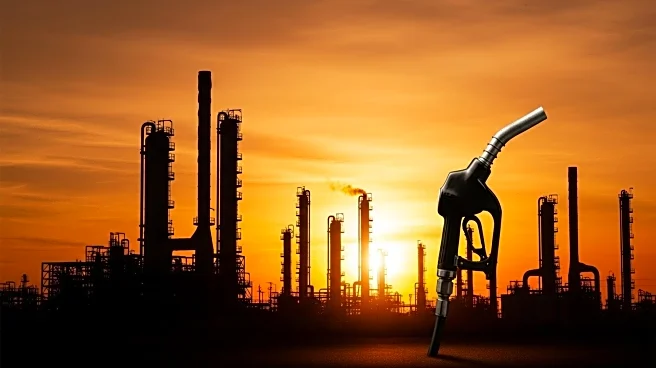What is the story about?
What's Happening?
A fire at Chevron's El Segundo refinery, the second-largest in California, has led to an expected increase in gas prices across Southern California. The explosion damaged a jet fuel production unit, and while the extent of the damage is still being assessed, the incident is anticipated to affect gasoline production significantly. The refinery, which produces a substantial portion of the region's motor vehicle and jet fuels, is crucial to the state's fuel supply. Economist Severin Borenstein from UC Berkeley noted that such fires typically lead to spikes in wholesale prices, which are quickly reflected at the pump. The current average price of gasoline in the Los Angeles-Long Beach area is $4.718 per gallon, marking a steady increase over the past year.
Why It's Important?
The fire at the Chevron refinery is significant due to its potential impact on fuel prices in a state already facing high costs. California's limited refinery capacity means disruptions can lead to substantial price increases, affecting consumers and businesses alike. The incident comes at a time when other refineries in the state are closing or reducing operations, further tightening supply. Governor Gavin Newsom's recent legislative actions, including allowing new oil wells and ethanol-blended gasoline, aim to balance environmental goals with economic needs. However, the immediate effect of the fire could exacerbate existing challenges in maintaining affordable fuel prices.
What's Next?
The duration of the refinery's downtime will be crucial in determining the extent of the price increase. If the facility remains offline for an extended period, gasoline prices could rise significantly. Imports and stored gasoline may help mitigate the impact, but additional imports could take weeks to arrive. Stakeholders, including government officials and industry leaders, will likely monitor the situation closely to manage supply and price stability. The incident may also influence future policy decisions regarding refinery operations and energy production in California.
Beyond the Headlines
The Chevron fire highlights the vulnerability of California's fuel supply chain and the broader implications for energy policy. As the state pursues carbon neutrality, balancing environmental objectives with economic realities becomes increasingly complex. The incident may prompt discussions on the resilience of energy infrastructure and the need for diversified energy sources. Additionally, the fire underscores the importance of emergency preparedness and response in critical industrial sectors.

















